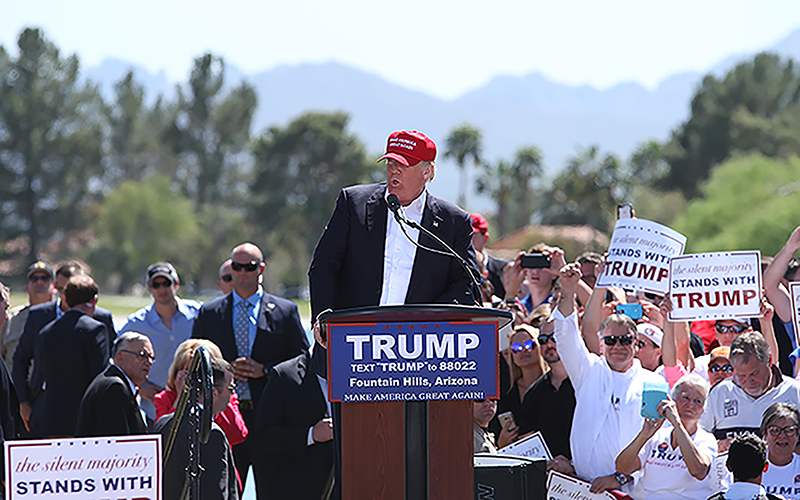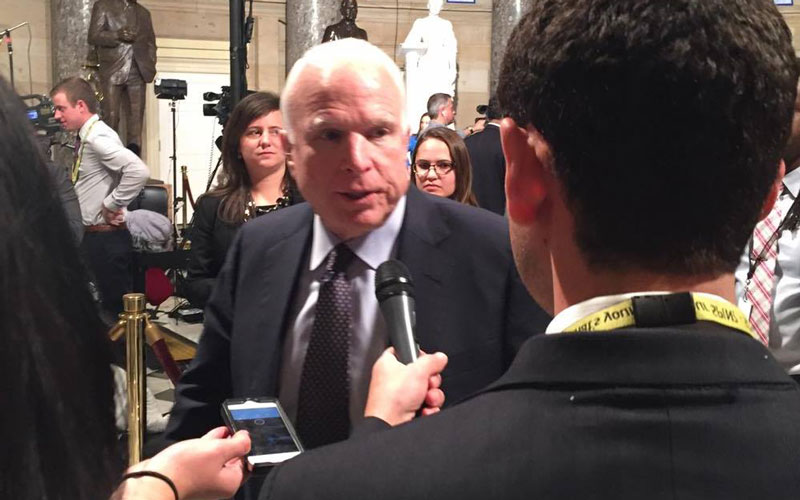
GOP presidential candidate Donald Trump speaking to a crowd in Fountain Hills ahead of Tuesday’s presidential primary election in Arizona. Trump won the state handily, with 47 percent of the vote. (Photo by Miguel Otárola/Cronkite News)

Sen. John McCain, R-Arizona, has sparred publicly with Donald Trump, the front-runner for the GOP presidential primary race. It’s unclear how a Trump nomination would affect McCain’s re-election bid. (Photo by Jessica Swarner/Cronkite News)
WASHINGTON – Donald Trump’s victory in Arizona this week put him one step closer to the Republican presidential nomination, an increasingly likely outcome that political analysts say could spell trouble for down-ticket Republican candidates.
But maybe not in Arizona’s GOP Senate race.
The two leading Republican challengers – Kelli Ward and Alex Meluskey – welcomed Trump as a nominee, while analysts and campaign officials for longtime incumbent Sen. John McCain said McCain’s record will likely carry him to re-election.
“He is John McCain,” said Jason Rose, an Arizona political consultant, “and if anyone can swim against the current, it’s him.”
But that doesn’t mean it won’t take some finesse on the part of the Senate hopefuls, who face a delicate balancing act this summer and fall: Attract centrists and independents – who make up the largest voting bloc in Arizona – without alienating Trump’s fervid supporters.
“If anyone in the McCain camp or other camps told you they had that answer today, they’d be kidding themselves,” Rose said.
Nathan Gonzales, editor at the Rothenberg & Gonzales Political Report, said the 47 percent of the vote that Trump won in the Arizona GOP primary Tuesday puts McCain in a difficult position.
There is no love lost between the two men. Trump ridiculed McCain’s war service, noting that McCain was a war hero for being captured and held by the North Vietnamese, before adding “I like people who weren’t captured.”
McCain has criticized Trump’s “uninformed and indeed dangerous statements on national security issues,” urging Republican voters to “think long and hard about who they want to be our next commander in chief and leader of the free world.” But he also said he would support the party’s nominee.
Independents made up 37 percent of registered voters in the state on Jan. 1, compared to 34 percent registered as Republicans and 28 percent registered as Democrats, according to the Secretary of State’s office.
Gonzales said McCain has to attract those independents who may not be enamored of Trump without alienating the 35 to 40 percent of the party that supports Trump.
“I think Senator McCain has to get those independent voters to focus on his race against (Democratic challenger, Rep.) Ann Kirkpatrick and focus on what he’s done for the state rather than get caught up in some sort of backlash that independent voters could have against Donald Trump,” Gonzales said.
He said Kirkpatrick faces a similar challenge with Democratic presidential front-runner Hillary Clinton, but to a lesser extent.
“I don’t think it’s good for Ann Kirkpatrick to be coupled in every way with Hillary Clinton, but I don’t know that she (Clinton) will be as big as a drag as what Trump looks like he could be on McCain,” Gonzales said.
Lorna Romero, a spokeswoman for the McCain campaign, said in an email that the campaign is confident Arizonans “will proudly vote McCain” over Kirkpatrick.
But before he can face Kirkpatrick, McCain has to win the primary against two challengers who think Trump will help their campaigns.
Ward, a former state senator, said any anti-establishment Republican presidential nominee will help her campaign, whether it’s Trump or Texas Sen. Ted Cruz, currently Trump’s closest challenger.
“I’m running an insurgent campaign as well,” Ward said. “It’s great to have someone new at the top of the ticket who is helping to wake people up to what is happening to the country.”
Meluskey’s campaign manager, Craig Bergman, said a Trump nomination would likely lead to record voter turnout – something he said would help Meluskey.
“I think the numbers and the turnout that we’ve seen in the Republican and Democrat parties are highly favorable to an outside, successful businessman like Alex Meluskey,” Bergman said.
Analysts are not so sure.
Arizona-based political consultant Rodd McLeod said a Trump nomination would bring Latinos, who tend to lean Democratic, to the polls. He also said the real-estate mogul’s comments about women could “turn off” Republican or independent women, leading them to either stay home or vote for someone else.
“People are not happy about having a candidate who comports themself in such a disrespectful manner,” McLeod said. “I think that’s going to be a problem for Republican candidates up and down the ticket.”
For Geoff Skelley, a political analyst at the University of Virginia Center for Politics, the unusual factors at play in this campaign could upend the usual coattail effect, in which parties generally win Senate races in states that their presidential candidate won. But that’s where McCain’s long tenure could come in to play, he said.
“I have a difficult time thinking McCain will lose his primary,” Skelley said, who was optimistic about McCain’s chances in the general election as well.
“I think McCain is a favorite,” Skelley said. “Maybe not a huge favorite, but a favorite nonetheless.”
Rose said it promises to be a challenging couple of months for the campaigns.
“Jazz is a great improvisational music,” Rose said. “People are going to be playing a lot of political jazz in the upcoming months.”